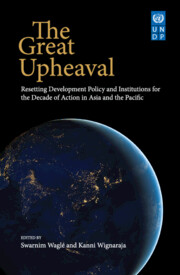Book contents
- Frontmatter
- Contents
- List of Figures
- List of Tables
- List of Boxes
- List of Appendices
- List of Abbreviations
- Foreword
- Acknowledgements
- Introduction
- 1 Aligning Sovereign Debt Financing with Climate Action in the Asia-Pacific Region
- 2 Melting Glaciers, Threatened Livelihoods: Confronting Climate Change to Save the Third Pole
- 3 Accelerating Universal Digital Connectivity
- 4 The Post-COVID-19 Future for Global Value Chains
- 5 Is Southeast Asia Falling into a Latin American–Style Middle-Income Trap?
- 6 Equality of Opportunity as a Measure of Development
- 7 Insights for Policymaking from the Multidimensional Poverty Index
- 8 COVID-19 and Human Security
- 9 Making COVID-19 Vaccine Universally Accessible
- 10 Enhancing the Provision of Global Public Goods: Ready for More Realism?
- 11 Asian-Pacific Regional Cooperation in the Post-COVID-19 Era
- 12 Pandemic Governance and Human Development: Early Lessons from Asia
- 13 Seven Lessons for Development Policy from the COVID-19 Pandemic
- About the Contributors
- Index
7 - Insights for Policymaking from the Multidimensional Poverty Index
Published online by Cambridge University Press: 28 February 2022
- Frontmatter
- Contents
- List of Figures
- List of Tables
- List of Boxes
- List of Appendices
- List of Abbreviations
- Foreword
- Acknowledgements
- Introduction
- 1 Aligning Sovereign Debt Financing with Climate Action in the Asia-Pacific Region
- 2 Melting Glaciers, Threatened Livelihoods: Confronting Climate Change to Save the Third Pole
- 3 Accelerating Universal Digital Connectivity
- 4 The Post-COVID-19 Future for Global Value Chains
- 5 Is Southeast Asia Falling into a Latin American–Style Middle-Income Trap?
- 6 Equality of Opportunity as a Measure of Development
- 7 Insights for Policymaking from the Multidimensional Poverty Index
- 8 COVID-19 and Human Security
- 9 Making COVID-19 Vaccine Universally Accessible
- 10 Enhancing the Provision of Global Public Goods: Ready for More Realism?
- 11 Asian-Pacific Regional Cooperation in the Post-COVID-19 Era
- 12 Pandemic Governance and Human Development: Early Lessons from Asia
- 13 Seven Lessons for Development Policy from the COVID-19 Pandemic
- About the Contributors
- Index
Summary
INTRODUCTION
The human development approach is holistic and freedom-based, reflecting the richness of human lives. Human development aims to expand all people's freedoms by directly enhancing human capabilities and creating conditions for decent and fulfilling lives. The global Multidimensional Poverty Index (MPI) identifies and profiles the situations of those who face acute deprivations in three foundational aspects of human development: health, education and standard of living (Box 7.1). The human development approach and the reduction of multidimensional poverty share common roots in Amartya Sen's capability approach and theory of development as freedom and draw upon three fundamental features: people, participation and policy.
People The human development approach emerged out of an understanding that economic or monetary indicators do not sufficiently measure progress in human flourishing; they do not reflect the richness of people's lives and the diversity of their well-being. Drawing on Sen's capability approach, the objective became the expansion of human freedom and reduction of disadvantages of many kinds. In other words, development aims to improve and enlarge human capabilities, along with actual achieved levels of well-being (Deneulin, 2004: 26). The assessment criteria reflect “the things people can do and be in their lives, now and in the future” – or what Sen called ‘functionings’ or ‘beings and doings’ (Deneulin, Shahani and International Development Research Centre, 2009: 23). This means that human development and poverty are inescapably multidimensional (Sen, 2000).
Participation and empowerment Participation serves as a key principle of the human development approach, as articulated by Mahbub ul Haq (Deneulin, 2004). Amartya Sen argues that people should be not seen as patients or beneficiaries of development, but as active agents, both as groups and individuals (Sen, 1985, 1999). The human development approach seeks to empower and support people as agents who determine their own life and the life of their communities (Deneulin, Shahani and International Development Research Centre, 2009).
Participation and empowerment also have an instrumental role in poverty reduction. Indeed, the “Moving Out of Poverty Study” interviewed persons who had exited poverty to ascertain what they perceived as the most important cause of their success: assistance from kinship networks; actions by government or nongovernmental organisations (NGOs), faith-based groups, or businesses; transferred or earned income, and so on.
- Type
- Chapter
- Information
- The Great UpheavalResetting Development Policy and Institutions in the Asia-Pacific, pp. 169 - 204Publisher: Cambridge University PressPrint publication year: 2022



